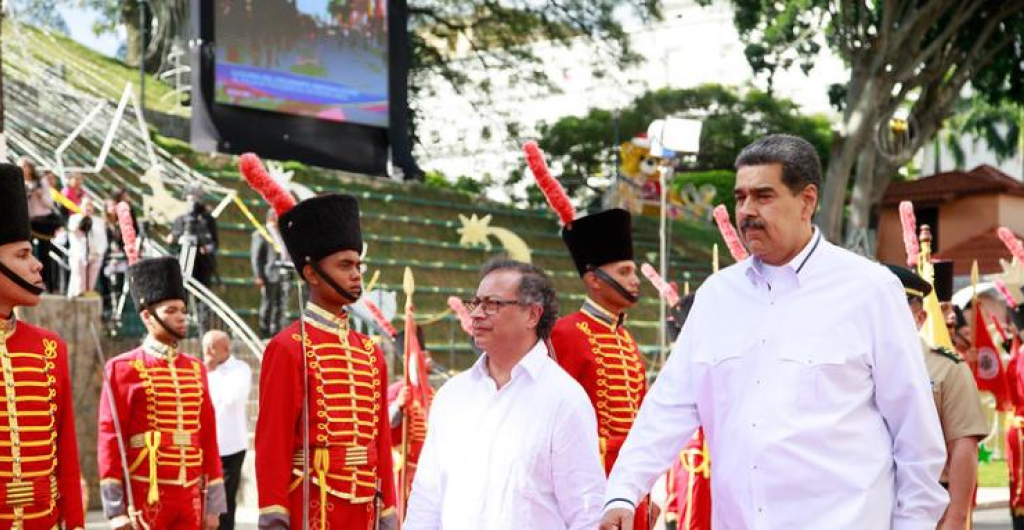
Several days have elapsed since the Venezuelan justice system officially disqualified opposition leader and presidential candidate Maria Corina Machado. This development has garnered significant international attention. However, Colombian President Gustavo Petro has chosen to maintain his silence on the matter, a decision that has sparked criticism from various quarters, both within and beyond Colombia.
With the disqualification and the return of US sanctions against Venezuela, the elections scheduled for the second half of this year are now uncertain. Venezuelan government sources have stated that they intend to proceed with the elections, but the assurances of state support promised to the opposition under the Barbados Agreement appear to be diminishing.
Silence of Gustavo Petro
The Colombian president played a key role in improving relations with Venezuela. In March of the previous year, Colombia took the initiative to reestablish diplomatic ties with its neighboring country. This move led to the reopening of the borders, which had remained closed since 2015, coinciding with the onset of the migration crisis.
In the year and a half since Petro assumed leadership in Colombia, he has made three official visits to Caracas. The most recent visit took place on November 18th of last year, during which he engaged in a bilateral meeting with Nicolas Maduro.
The relationship of trust with Maduro has aimed at facilitating the removal of sanctions and normalizing relations with the neighboring country. Therefore, it is surprising that Colombia, including its president, has remained silent in response to this critical situation, which could potentially lead Venezuela back into a phase of stricter sanctions.
The Foreign Ministry and the president have not made any statements regarding the current situation in Venezuela. Despite numerous comments on his official social media accounts, there has been no official response from either the Foreign Ministry or the president. This lack of communication has prompted opposition groups to accuse the Colombian president of supporting Venezuelan strategies aimed at impeding the opposition’s candidacy.
The cases of Peru and Guatemala
The Colombian head of state expressed strong concerns about the recent inauguration of the president of Guatemala. During the ceremony, the opposition attempted to disrupt the transfer of power in Congress. Gustavo Petro played a prominent role in defending the constitutional rights of the elected president.
In December 2022, amidst the Peruvian crisis and the forced departure of President Pedro Castillo, Gustavo Petro took a stance in support of the rights of the former Peruvian president. The Colombian president remarked, “There are cases where elected presidents find themselves in prison when they should be participating at the diplomatic table,” a few weeks following Castillo’s removal.
“Why do there have to be parliamentary coups and violence?”, then asked the Colombian president, who advocated for a democratic pact that would avoid such situations in which they come to power “to eliminate their opponent physically”.
Chile and Guatemala express “concern”
Other leftist governments in the region have also expressed their views on the issue. Gabriel Boric, the President of Chile, has expressed his “concern” and endorsed Norway’s proposal to establish a commission promptly. This commission’s purpose is to oversee and confirm the Barbados Agreements, which are designed to ensure an open, democratic, and transparent electoral process.
“We express concern about the situation affecting political leaders of the Venezuelan opposition who could be prevented from participating in the upcoming presidential elections in that country,” announced a communiqué from the Chilean Foreign Ministry.
The recently elected president of Guatemala, Bernando Arévalo, who also holds progressive views, expressed his concern regarding the situation of the Venezuelan opposition. In an official statement, Guatemala voiced its apprehension about the electoral process in Venezuela. The country also expressed regret over the Supreme Court of Venezuela’s decision to disqualify María Corina Machado, the leader of the opposition and the winner of the primary elections in October 2023, from holding public office for 15 years.
“This decision is contrary to the spirit of the Barbados Agreements, aimed at facilitating the holding of free, democratic and transparent elections in Venezuela”, stated Arevalo’s government in the Central American country.
Appeal to the “international democratic community”
The Venezuelan opposition grouped in the Democratic Unitary Platform has asked the “international democratic community”, especially the leaders of France and Colombia, to intervene to reverse the disqualification of the anti-Chavez leader Maria Corina Machado.
The leader of the opposition commission responsible for engaging in dialogue with the Venezuelan government, Gerardo Blyde, has urged the nations that have endorsed the Barbados Agreements to utilize “diplomatic channels” to ensure the full reinstatement of these agreements. Blyde has noted that these accords have experienced partial lapses, particularly following the ratification of political sanctions against Machado.
The opposition leader assured that in the last months he had met with both Emmanuel Macron and Gustavo Petro, who expressed their support to the agreements reached in Barbados between the Venezuelan government and the opposition. In those agreements, the opposition’s options to present a candidacy “with electoral guarantees” are upheld.
“Petro has asked for the reversal of all, not one, all administrative disqualifications. Petro, Mr. President, you have told us that you are committed to this process; use your diplomatic channels to help us so that this can be true and that we can have a free election in Venezuela”, Blyde asked the Colombian president.
See all the latest news from Colombia and the world at ColombiaOne.com. Contact our newsroom to report an update or send your story, photos and videos. Follow Colombia One on Google News, Facebook, Instagram, and subscribe here to our newsletter.

